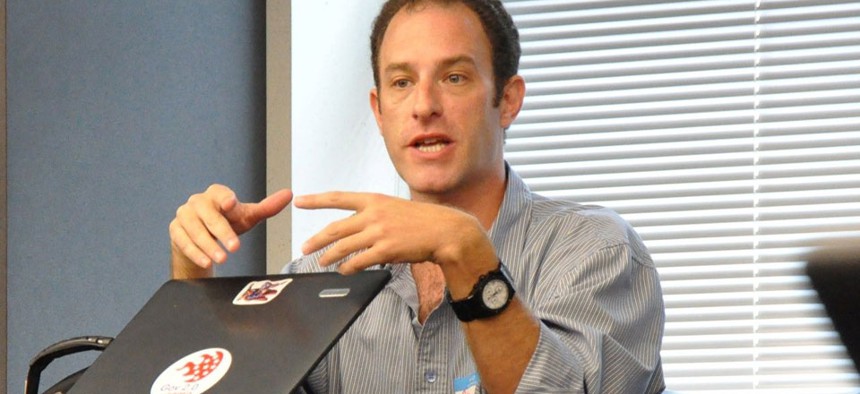Q&A: How City Governments Go Digital

"The federal government also has the resources to hire a bunch of people really quickly and do things the local side can’t," Alan Silberberg said. Flickr user politicalactivitylaw
The future of digital government will be about smaller companies and citizen security, GOV2.0LA founder says.
LOS ANGELES -- Cities that embrace digital government do it for one of two reasons, says Alan Silberberg, founder of the five-year-old Gov2.0LA conference: Either elected officials and top bureaucrats see an opportunity to save money and provide services more efficiently or citizens demand government services that can compete with the private sector.
Digital initiatives' success usually requires both, he told Nextgov Tuesday along the sidelines of Social Media Week in Los Angeles.
“You have a lot of governments that are being pushed by their constituents, saying ‘we all have these tools at home, like iPhones and iPads, and look how easy it can be,” he said. “There are also people inside government saying we need to save money, we need to deliver services faster, better and more efficiently and there are all these cheap tools to do that.”
Silberberg worked in the Clinton White House and the National Archives before moving to Los Angeles where he worked for Paramount Pictures and founded Digijaks, a company focused on digital government and cybersecurity.
The following interview transcript has been edited for length and clarity.
Why did you decide to locate your conference in Los Angeles?
Los Angeles is the first or second largest city in America, depending on how you look at it, so the impact of things done here has ripple effects. Historically we’re also risk takers here, so we’re freer to innovate in ways other cities might not be.
There are a series of startups that have come here in the past several years that are really pushing from the outside, saying ‘There’s a cheaper, flatter, easier way to do these things that will allow the government to communicate with us in a more seamless fashion.’ There are also more established companies such as NationBuilder [a community organizing platform] and ESRI [the government’s largest mapping vendor based in Redlands, Calif., near LA] and that’s established Los Angeles as a West Coast thought center for this transition to digital government.
What makes a city embrace digital government?
When you get below the state level, it’s a real local thing. You’re dealing with local peculiarities where some counties or cities might absolutely adopt everything digital and put everything in the cloud and for others everything’s old-line and hardwired and 10-year contracts.
A lot of it is leadership driven. Sometimes there’s a mayor or a city council that says ‘We’re going to go down this road and embrace technology’ like Bloomberg did. Eric Garcetti, our mayor now, is a major Gov2.0 advocate. A few years ago he and I were on a panel at a different Social Media Week event, and he had two phones in his hand and was tweeting during the panel and showing in real time, ‘This is how it is; I’m taking care of some business while I’m sitting here on a panel.’
With most elected officials and bureaucrats who haven’t adopted these tools yet, what they’re afraid of is being called on the carpet for something bad or that might be perceived as bad. They don’t want the way business is done to be exposed to the public.
Are cities sharing digital tools, the code for websites and mobile apps, things like that?
That’s certainly happening in the sense that they’re buying technology from the same vendors. Data.gov [the U.S. government’s open data repository] has also created subsidiaries for local data and there’s a lot of local data sharing going on there now. Cities are sharing code on Github [a repository for open source Web code and tools].
I think there’s a huge opportunity for some [digital government vendors] to make their code available to the public in a limited form so they can still control their intellectual property. You don’t want to take away companies’ ability to compete, but there has to be some happy medium. Maybe once you’ve created something for a government then that government’s allowed to share that code on Github.
What’s different between how the federal government tackles digital projects and the way cities do?
The federal government does things in a much more centralized way because it can. You have a centralized purchasing authority in the General Services Administration that can dictate a lot of policies, whereas at the state and local level you have 50 states with pretty raucous legislatures and 18,000 or 19,000 municipalities with governing bodies. You break that down by all the egos and politics and it gets very complex.
Can cities be more nimble because they’re closer to constituents and have fewer layers of bureaucracy?
You’d think that, but the federal government also has the resources to hire a bunch of people really quickly and do things the local side can’t.
Where should smaller cities and towns be putting their digital resources, the ones that can’t afford to jump in the way New York and Chicago have?
There are a lot of things they can do that are just budget driven. Everyone has to cut budgets and save money so they can look at legacy software and hardware contracts and move a lot of that into the cloud. They can switch to WordPress sites and use Gmail instead of some legacy email system. Making these shifts is a lot easier than it used to be.
What do you see on the horizon in digital government for the next five to 10 years?
Gov2.0LA is focusing a lot on that issue of where we’re going in the next decade and more. One thing we’re seeing almost every day is how emergency management is completely evolving from the ground up in terms of how they deliver services, how they respond to people and how they use maps and imagery to get people help in real time. Living in earthquake country here, I can tell you 10 years ago you’d hear a little blurb on the radio and that was it. Now there are websites and maps telling you evacuation routes. It’s all there; you don’t even have to go look for it. That’s transformative.
Last week with the Navy Yard shooting, the Navy confirmed the shooting to the public on Twitter instead of in front of TV cameras and that sort of says it all. If you look at Colorado floods or wildfires here in California, city managers and firefighters and police and the Red Cross are using social media not just to communicate information to the public but also to communicate with each other. Clearly that’s one thing that won’t change. And it’s going to take on a level none of us can really conceive now
The second important area is public-private partnerships. Governments are starting to recognize that they can create flexible contracting structures where you can bring in smaller tech companies that may not have the resources to compete for a two or five year contract but can compete against other companies like them for a flash contract. That can help the government learn at a much faster rate.
The third area, and this is sort of obvious but it’s the subject du jour, is cybersecurity, which is really about tracking citizens. Increasingly, citizens want to know ‘if the city of Santa Monica wants me to put a credit card in a parking meter, what are you doing with that information and who else has it? Are you sharing it with contractors or third parties?’
A big part of the next decade [in municipal Gov2.0] will be about how cities manage citizens’ privacy and security expectations. Because the more they push services online, the more they move to the cloud and to mobile, the more data is out there for a hacker to steal whether it’s health records, mortgage records or tax records. Governments have to basically focus not just on delivering services but on delivering services in a way that they can’t be sued for breach of privacy.
Do you mean there will be more tracking, more security around tracking or more transparency around tracking?
It will be all three. Citizens’ groups will be demanding to know who’s looking at their information and how it’s being secured, and they’ll be demanding that cities adopt policies that recognize and are responsible about this interaction between the government and private sectors in terms of data.
Digital government companies also have to be very responsible and transparent about this, because the same tools that give citizens better services can sometimes be used by someone else to steal their data.
Join us at Nextgov Prime Oct. 15-16 in Washington for indepth discussions about open data, cloud computing, information security and much more. Registration is free for federal employees.
NEXT STORY: Why Do We Go to Space, Anyway?






